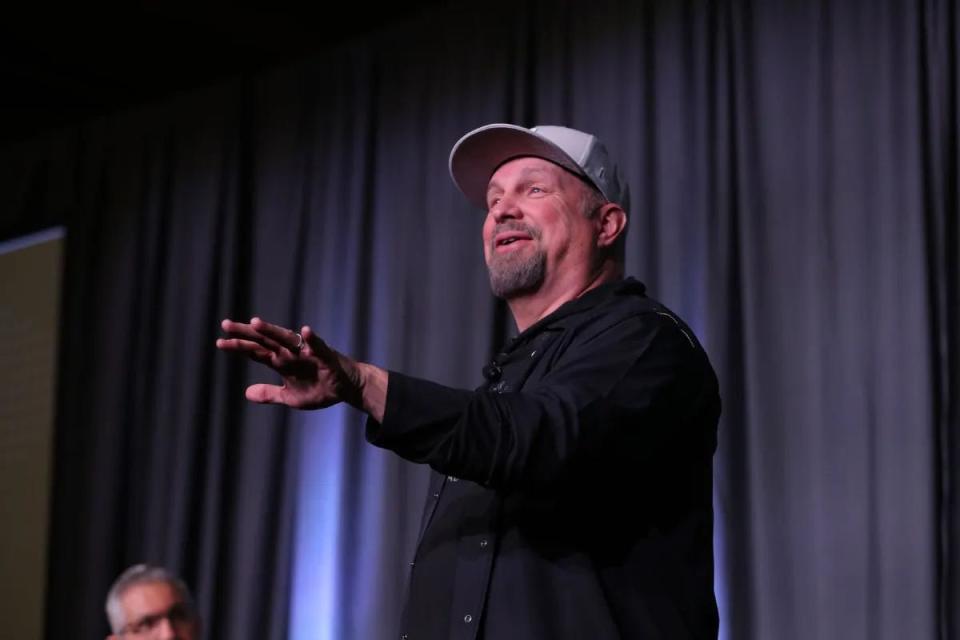Garth Brooks says he'll be a fan if AI makes a 'song that kills me and makes me cry'
- Oops!Something went wrong.Please try again later.
- Oops!Something went wrong.Please try again later.
- Oops!Something went wrong.Please try again later.
Leave it all up to Country Music Hall of Famer Garth Brooks — who counts "Friends in Low Places" in his catalog of songs that have reformatted expectations of sales and touring success in music — to find a way to summarize present-day American society in terms that both die-hard country music fans and a roomful of radio employees and executives can understand.
At the Country Radio Broadcasters 54th annual Country Radio Seminar conference Monday night, Brooks talked with CRB executive director R.J. Curtis about what he considers are America's twin concerns.
Recalling Johnny Cash's cover of the African American folk ballad "Ballad of John Henry," Brooks said the industry's people-power-driven arts of writing songs and and gaining radio airplay are now in competition with artificial intelligence apps and streaming services. Control of the genre's listener base is evolving to digital algorithms instead of station programmers.
When he appeared at CRS conferences in 1989 and 1990, Brooks recalled, programmers had "to stare, honestly into the eyes of artists and still judge precisely who the [country music industry's] next stars would be."
“But if an AI program writes a song that kills me and makes me cry, isn't that what songwriting is all about?" he said. "If AI gets to that level, I have to be thankful I get to be a fan that one of those songs touches.”

"Don’t underestimate how powerful you are just as human beings against ratings, streaming numbers, and all that stuff," Brooks continued. "Don’t forget your gut, don’t forget what moves you. That’s the gift God gave you."
He caustically added: "I see the internet entering the dis-information age. ... The internet is dangerous ... civil war is waiting if we don't watch out."
He noted radio's importance in preserving national unity and said broadcasters in the room should advise the people being heard on stations to honor one golden rule couched in a powerful question: "Do people listening to you feel better about the future?"
Brooks, the top-selling solo artist of all time, compared radio's battle for relevance today to the 150-year-old tale of John Henry and the battle of a man against a steam drill. John Henry died with a hammer in his hand.
"Heart differentiates the man from a machine," Brooks said. "Radio's time isn't coming to an end."
Asked how and why he was able to return from retirement in 2001 to eclipse his previous touring success and develop a legacy that's evolved into a forthcoming $50 million Lower Broadway honky-tonk, the Oklahoma native noted: "Take what you've done and gamble it again. Be the guy who starts the revolution."
Concerning that concept, Brooks spent significant time discussing the era between his eponymous debut album and "No Fences," its 1990 follow-up.
Before being a member of the hotly touted "Class of 1989," Brooks — then 27 and learning how to harness his self-admitted "superpower" of being an "ordinary guy" — was 18 months removed from being signed at a songwriting showcase at the Bluebird Cafe and feeling a bit nervous about being considered in the same breath as Clint Black and appearing at CRS.
Neither he nor Black were touted as one of the genre's "New Faces" at the music event. Instead, in Brooks' humble estimation, it was a case of him not working hard enough and Black doing the opposite.
"I was married to Sandy (Mahl, his first wife) back then and she pointed out this guy who wore a black hat and striped shirt just like me — the only difference, [Clint] worked his a-- off."
Four debut album Top 10 singles and 13 months later, Brooks returned to CRS. Like Black a year prior, he was not one of country music's next "New Faces."
Instead, he became something greater.
"I got up at the CRS luncheon and performed after Alan Jackson," Brooks recalled. "By the second chorus of 'Friends in Low Places,' the whole crowd in that room was singing along. At that point, I knew I had something special."
Three decades later, that "something special" has led to November 2022's unveiling of the Garth Brooks "No Fences" Award, which CRB notes "will recognize an individual in the country industry who has demonstrated Garth's innovation, creativity, and tenacity."
"We all know about Garth's monumentally successful career, which established this genre as popular, sustainable, and mainstream," Curtis said. "What many don't know, however, is that concurrent with his many personal accomplishments, Garth Brooks has given unwavering support for CRS during the past 30 years by showing up to CRS annually and creating innovative ways to engage, entertain and educate CRS attendees that perfectly match the 'growth through sharing' mission of CRS."
Giddy about the honor, Brooks commented on how he succeeded to a level befitting such an award. His pop success, he noted, fell in a period of rock's reconstruction between metal and grunge, urban's attempt to balance between rap and R&B, and house music's attempt to mirror disco's success.
"People needed something [back then]," he said. "Radio is the window to the people. It could've been anybody, but it was me."
Brooks added a statement early in the conversation that summarizes the most important key to his success — as well as modern country radio's and America's in general.
"Communication makes everything better."
This article originally appeared on Nashville Tennessean: Garth Brooks at CRS: Country star on AI, dis-information and his legacy

